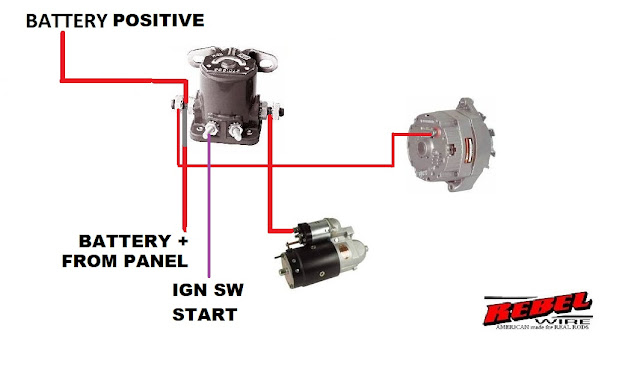Ford Tractor Starter Solenoid Secrets
Your Ford tractor sits silently, mocking your attempts to coax it to life. The key turns, the dash lights flicker… but nothing. Is it the battery? Maybe. But before you go shelling out for a new one, consider the humble, often overlooked, starter solenoid. This little electromechanical marvel is the unsung hero (or villain, depending on its mood) of your tractor's starting system.
The starter solenoid for a Ford tractor acts as a heavy-duty relay, controlling the large current needed to crank the engine. Think of it as the middleman between your ignition switch and the starter motor. When you turn the key, the solenoid engages, sending power to the starter motor, which in turn spins the engine over. Without a functioning solenoid, your tractor is going nowhere fast. This tiny component is the linchpin of the entire starting process.
Tracing back the history of the starter solenoid reveals its evolution alongside the development of the electric starter motor itself. Early tractors relied on hand cranks, a strenuous and sometimes dangerous method. The introduction of the electric starter, and by extension the solenoid, revolutionized tractor operation, making starting easier and safer. The solenoid ensures a controlled and powerful surge of electricity to the starter motor, preventing damage to other electrical components.
So, what happens when this crucial component goes bad? The symptoms of a failing Ford tractor starter solenoid can be frustratingly vague. Sometimes, you might hear a click when you turn the key, but the engine doesn't crank. Other times, you might experience nothing at all. A faulty solenoid can also lead to intermittent starting problems, leaving you stranded in the field at the worst possible moment. Diagnosing a bad solenoid often involves checking for voltage at the starter motor and at the solenoid itself using a multimeter.
Replacing a Ford tractor starter solenoid is usually a straightforward process. Locate the solenoid, typically mounted on the starter motor itself or nearby on the firewall. Disconnect the battery cables, then remove the wires connected to the solenoid. Unbolt the solenoid and install the new one, reversing the steps. While the specifics may vary depending on the tractor model, the general process is relatively simple and can often be done with basic hand tools. Ensuring correct installation is crucial to prevent further starting issues.
One benefit of a properly functioning starter solenoid is the extended lifespan of the starter motor. By regulating the current flow, the solenoid protects the starter from excessive wear and tear. Another benefit is increased safety. The solenoid prevents accidental starting by ensuring the starter only engages when the ignition is turned. Finally, a reliable solenoid simply means less hassle and downtime, keeping your tractor working when you need it most.
When troubleshooting starting problems, remember to check all connections for corrosion or looseness. A simple cleaning or tightening can sometimes resolve the issue. Also, ensure the battery is fully charged, as a weak battery can mimic solenoid problems.
Advantages and Disadvantages of a Typical Starter Solenoid
| Advantages | Disadvantages |
|---|---|
| Protects the starter motor | Subject to wear and tear |
| Enhances safety | Can be affected by corrosion |
| Relatively inexpensive to replace | Can cause intermittent starting issues |
Best Practices for Starter Solenoid Maintenance:
1. Regularly inspect the solenoid and its connections for corrosion or damage.
2. Clean connections with a wire brush or contact cleaner.
3. Ensure battery cables are securely attached.
4. Test the solenoid using a multimeter if starting problems occur.
5. Replace the solenoid proactively if it shows signs of wear or age.
Frequently Asked Questions:
1. What does a starter solenoid do? It acts as a relay, sending power to the starter motor.
2. How do I test a starter solenoid? Use a multimeter to check for voltage.
3. Can I bypass a starter solenoid? Yes, but it's not recommended as a long-term solution.
4. Where is the starter solenoid located? Typically on the starter motor or nearby.
5. How much does a replacement solenoid cost? Prices vary, but they are generally affordable.
6. What are the symptoms of a bad starter solenoid? Clicking sounds, no cranking, intermittent starting problems.
7. Can a bad solenoid drain my battery? It can contribute to battery drain if it's stuck engaged.
8. How often should I replace my starter solenoid? Replace it as needed or if it shows signs of wear.
One helpful tip is to carry a spare solenoid, especially if your tractor is older or used in demanding conditions. This can save you time and frustration in the field. Also, consider investing in a good quality solenoid, as cheaper options may not last as long.
The starter solenoid for your Ford tractor, despite its small size, plays a monumental role in keeping your machine operational. From its historical significance in replacing the hand crank to its modern-day function of protecting your starter motor, the solenoid is an essential component. Understanding its operation, recognizing the signs of failure, and knowing how to troubleshoot and replace it are critical aspects of tractor ownership. A properly functioning starter solenoid translates to less downtime, increased productivity, and a smoother, less stressful farming experience. So, the next time your Ford tractor refuses to start, don't overlook this small but mighty component. Taking the time to maintain and care for your starter solenoid will ensure your tractor is ready to work when you are, providing years of reliable service. Don't let a failing solenoid leave you stranded – address the issue proactively and keep your tractor running strong.
When does lucifer get his devil face back unmasking the devilish details
Navigating the shadows the enigmatic alex benedetto from gangsta
Madden 24 domination which team reigns supreme












